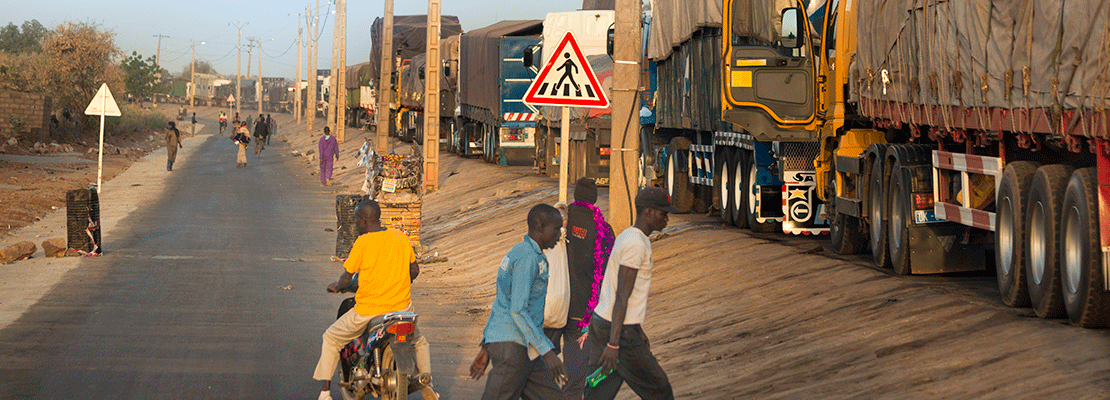Connecting national Customs systems to share data on transit operations is a priority for the Customs administrations of West and Central Africa, as well as for economic operators, international institutions and development partners working in this region. The objective is to secure, simplify and speed up the flow of commercial goods in transit, especially those coming from seaports and destined for land-locked countries. Against this background, a key project came to fruition a few years ago with the deployment of the Interconnected System for the Management of Goods in Transit (SIGMAT), already operating in five countries with two more to join soon.
Unlike other Customs procedures, which happen in one place, transit requires an exchange of information from at least three places, namely where the transit was initiated, at the borders, and where it terminates. In West Africa, the process requires a transit declaration to be registered at the border of each country until the cargo reaches its destination. With SIGMAT, Customs administrations in West Africa are moving away from manual and paper-based transit procedures by connecting their computer systems. A transit declaration is registered in the departure country, and a copy of it is sent electronically to the computer systems of the transit and destination countries to warn of the arrival of the goods. At borders, trucks are not required to wait for a new Customs declaration; the same declaration is used during the entire process. Customs officers at the border, or at the destination office, then confirm the arrival of the goods in their computer system and confirmation is sent electronically to the departure country. As the Customs administrations involved in the project use three different types of automated Customs systems, an interface had to be built to allow for this exchange of information, and standardized messages – in terms of structure and data format – had to be developed.
SIGMAT is the result of a long process, which involved many actors. With the financial support of the European Union (EU), the Customs administrations of some of the countries making up the Economic Community of West African States (ECOWAS) started working on the interconnection of their systems at the end of 2011, under an initiative called ALISA. In 2013, the Customs Administration of Côte d’Ivoire decided to allocate some of the funds received from the EU under the Programme d’appui au commerce et à l’intégration régionale (PACIR) to the development of functional and technical specifications, with the support of the WCO and the participation of the Customs Administrations of Mali and Burkina Faso. Many other international organizations and development agencies were involved in the work, including the United Nations Conference on Trade and Development (UNCTAD), the World Bank, the Japan International Cooperation Agency and the German Agency for International Cooperation. Senegal Customs joined the project in 2014, followed by Togo in 2016.
The ECOWAS Commission adopted the project in 2015 and started working on the development of SIGMAT. The System then benefited from the support of the Trade Facilitation West Africa (TFWA) Program, an initiative driven by multiple development partners that aims to improve existing trade facilitation measures in West Africa. The WCO has continued to provide support, including by training IT experts in Customs administrations to develop message specifications based on the WCO Data Model, to enable them to achieve their goals when it comes to the interconnection of computer systems.
By enabling electronic data about cargo in transit from one border to another to be automatically exchanged between several Customs administrations, SIGMAT offers huge benefits to Customs, traders of all sizes, companies and governments. SIGMAT is expected to enhance the efficiency and transparency of Customs operations and procedures, improve risk analysis capabilities, and significantly boost regional trade by lowering the cost of trade operations.
Since its launch in 2019, the System has been successfully deployed across the following key trade corridors: Abidjan-Ouagadougou, Abidjan-Ouagadougou-Niamey, Cotonou-Niamey and Lome-Ouagadougou. Countries along the corridors have recorded increased revenue, shorter border crossing times and reduced management costs.
Ongoing activities supported by TFWA include:
- deploying SIGMAT in Côte d’Ivoire and Burkina Faso for goods transported by rail as well as by road;
- developing a mobile version of SIGMAT which will enable interconnection between Customs administrations at locations where it is not possible to use the desktop version;
- supporting the expansion of the interconnection within the region;
- supporting training sessions for Customs officers, freight forwarders and other relevant stakeholders; and
- acquiring IT equipment for the deployment of SIGMAT in Mali and Senegal.
Any Customs administration could eventually benefit from SIGMAT. Its implementation will not require development for those using the ASYCUDA World Customs computer system, making the adoption of SIGMAT particularly feasible for them.
However, there are some important prerequisites. Interested administrations would need to set up a team including officers with strong leadership skills, and ensure that the changes to systems and procedures are supported by strong political will. Changing systems also means changing ways of operating in the field. Administrations would need to train their field staff in order to align their practices, as a lack of harmonization would undermine the benefits of digitalization. Last but not least, they must have the legal basis for exchanging information at the bilateral or regional level.
More information
Dion Benetatos, Communications Specialist at the World Bank Group, dbenetatos@ifc.org
Vyara Filipova, WCO Secretariat, facilitation@wcoomd.org

